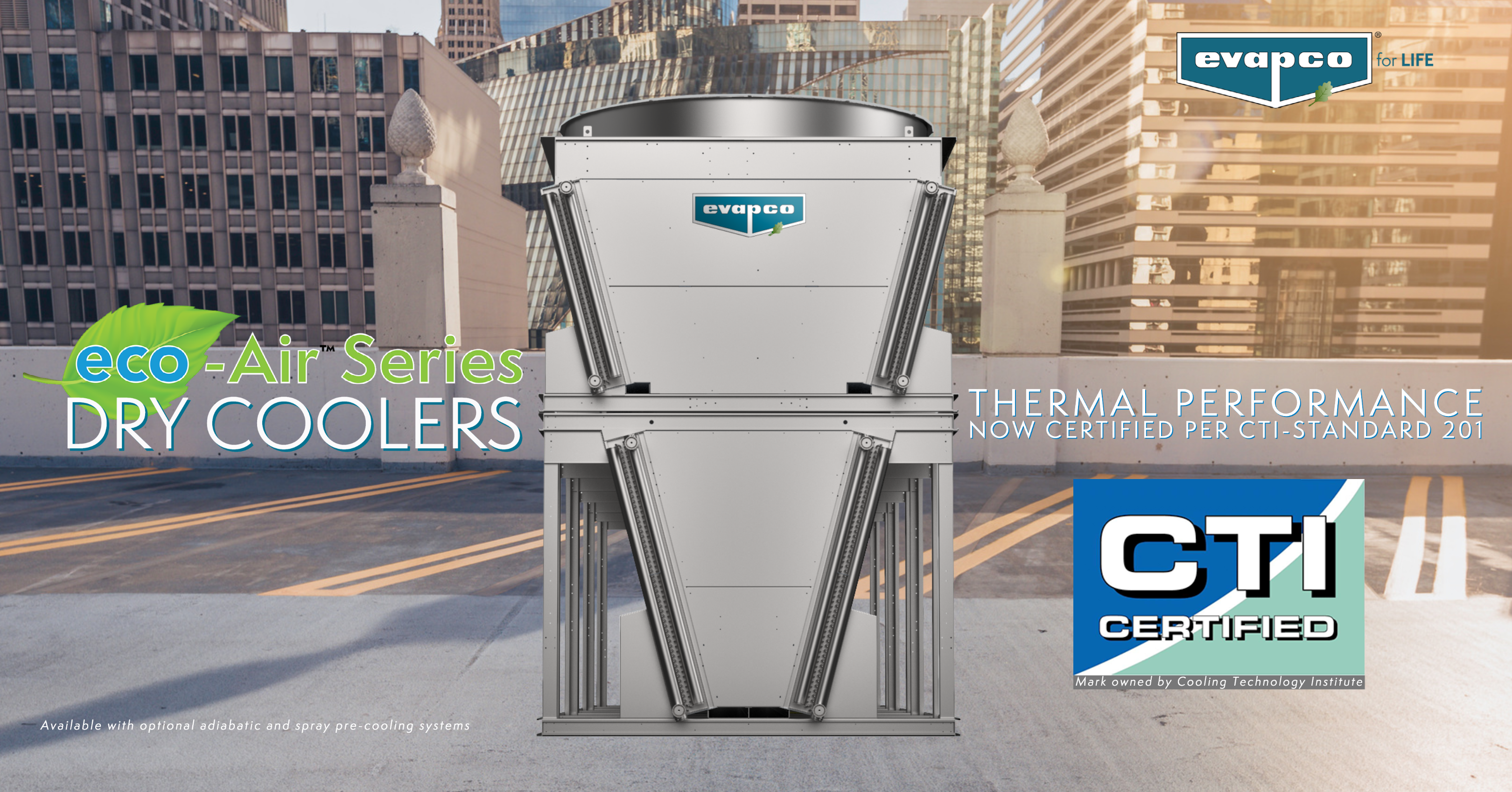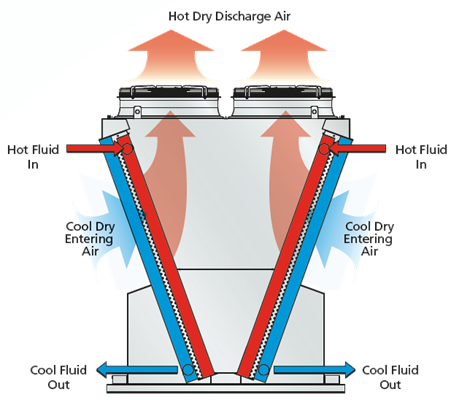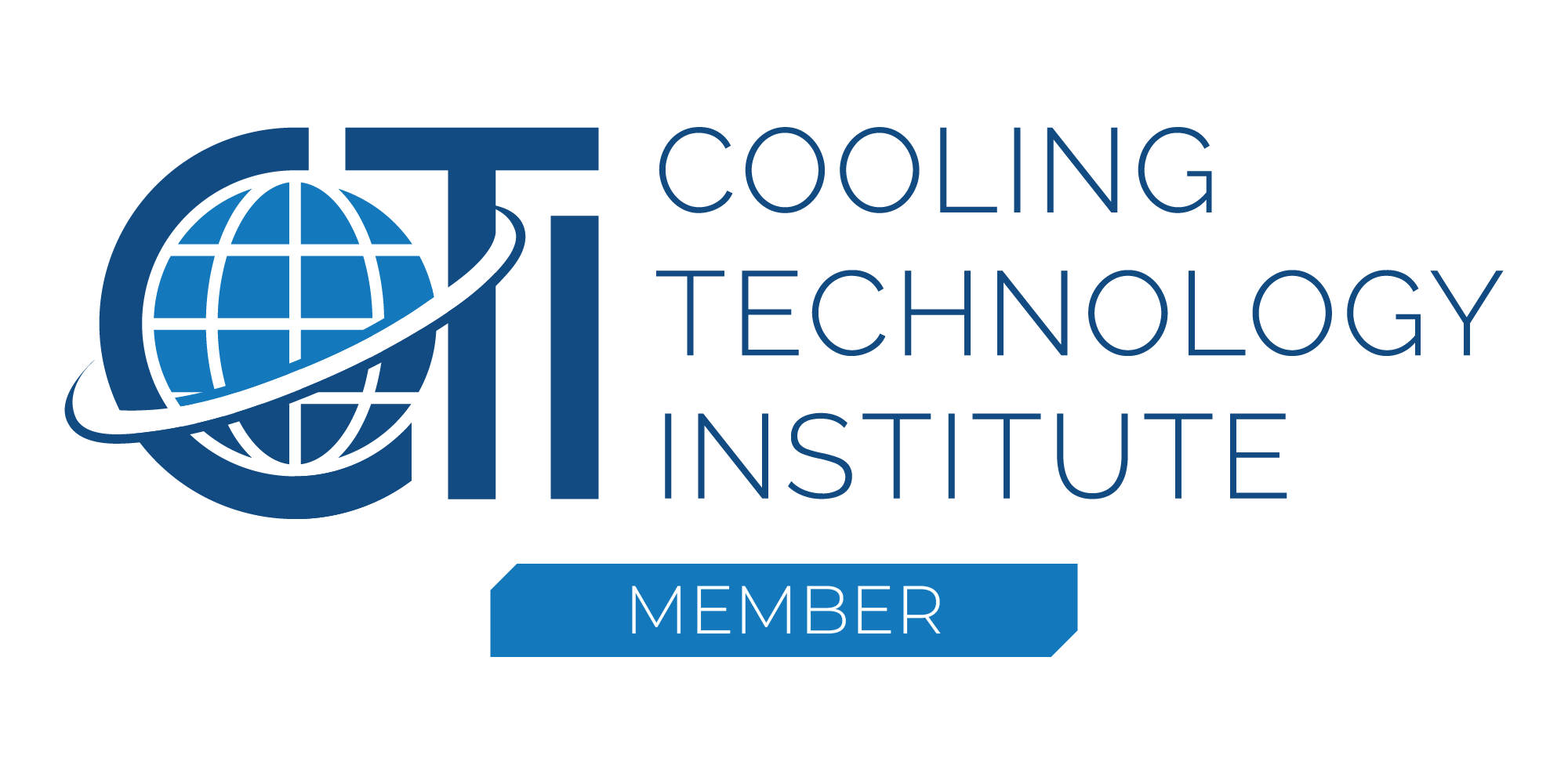
CTI Certification

EVAPCO’S eco-Air Series of EAW Dry Coolers are CTI certified per Standard STD-201.
As the global climate continues to evolve, with rising temperatures and reduced water availability, consumers are exploring cooling technologies which can minimize water consumption.

Dry coolers use no water for cooling (unless equipped with entering air pre-cooling systems for high ambient temperatures) and rely only on sensible heat transfer from the fluid in the closed loop to the ambient air. Dry coolers have a lower cooling efficiency as they do not utilize latent heat transfer for cooling, therefore they require more surface area and airflow for heat transfer. These requirements result in equipment with a physically larger footprint compared to evaporative cooling equipment, and typically higher operating horsepower. Dry coolers are also limited to providing leaving fluid temperatures higher than the ambient dry bulb temperature. When utilized with entering air pre-cooling systems, dry coolers can provide lower leaving temperatures and be viably applies to conventional HVAC applications, while only utilizing water in the hot summer months.
In geographies with no water availability or reduced water distribution infrastructure, however, dry coolers play a crucial role. It is therefore very important that consumers are assured that their dry cooler will perform thermally as rated by the equipment manufacturer. Thermally deficient equipment costs the consumer more in the long run by using more power than expected and will not meet required performance at peak ambient temperatures.
EVAPCO’s eco-Air Series of EAW Dry Coolers are CTI certified for their thermal performance per CTI Standard STD-201.
Please read along to learn more about CTI certification and why it should matter to you!
What is the value of CTI Certification?
All reputable cooling equipment manufacturers have their products certified by the Cooling Technology Institute (CTI) but many contractors, engineers and owners are not familiar with the process it takes to get there.
In 2018, CTI adopted test code ATC-105DS for dry coolers. Prior to 2018, no independent third-party testing or certification program existed in North America for dry coolers. As of March 2022, CTI has included dry cooler thermal performance in their certification standard STD-201, which previously only covered evaporative products.
To understand the value of certification, we must understand who CTI is and what certification entails.
Who is CTI?
CTI is an independent third-party organization who validates the published thermal performance of evaporative and dry heat rejection equipment. Membership is voluntary and requires all evaporative and dry cooling products listed in the program to be rated on a uniform scale. Thermal

performance certification by CTI offers credibility to the performance ratings published by each manufacturer. CTI was established in 1983 and today is comprised of 84 individual manufacturers representing approximately 190 product lines. Prior to this unbiased organization being formed, there was minimal control over the manufacturer’s thermal performance ratings.
STD-201 is a document written by CTI that describes the manufacturer’s expansive requirements to certify a product.
These requirements include:
- Annually pay administrative fees and test expenses.
- Submit a “Data of Record” to CTI. This includes specific design information and detailed component breakdown (size and supplier) of every individual product model to be certified.
Submit thermal performance ratings and rating methodology to the CTI Administrator. This information remains confidential; however it provides CTI the information it needs to correctly validate performance ratings.
Publish on a public domain at least 10 different performance conditions for each individual model in each product line.
Make publicly available all physical data of each CTI Certified product model. This is typically done via a product catalog.
Carry out and pass initial thermal performance qualification testing (in accordance with CTI test procedure ATC-105 for evaporative products, and ATC-105DS for dry products) of an individual model selected by the CTI administrator. This test requires either dedicated lab space or on-site field testing at a customer’s site.
Annually carry out and pass thermal performance reverification testing (per ATC-105 & ATC-105DS) on a different model selected by the CTI administrator.
Due to instrumentation tolerances, there are limitations set on the parameters that can be tested.
Below are the certification limits set by CTI for evaporative products:
| Operating Parameters | Units |
| Wet Bulb Temperature | 50°F to 90°F (10° to 32.2°C) |
| Minimum Range | 4°F (2.2°C) |
| Minimum Approach | 5°F (2.8°C) |
| Barometric Pressure | 27" Hg to 31" Hg (91.4 kPa to 105 kPa) |
| Process Fluid Temperature | <125°F (51.7°C) |
Below are the certification limits set by CTI for dry products:
Operating Parameters | Units |
| Dry Bulb Temperature | 41°F to 122°F (5°C to 50°C) |
| Minimum Range | 4°F (2.2°C) |
| Minimum Approach | 5°F (2.8°C) |
| Barometric Pressure | 27" Hg to 31" Hg (91.4 kPa to 105 kPa) |
| Process Fluid Temperature | <212°F (100°C) |
Increasing the understanding of CTI Certification helps illustrate the tremendous value of purchasing CTI Certified equipment. CTI Certification eliminates the liability for the consulting engineer as it pertains to the performance of evaporative and dry cooling equipment while giving credibility to manufacturer’s published performance ratings. Be certain from a design, installation, and owner standpoint, that CTI Certified equipment is utilized on all your projects!
For more information on CTI Certification, please contact your local EVAPCO Sales Representative or visit www.cti.org!